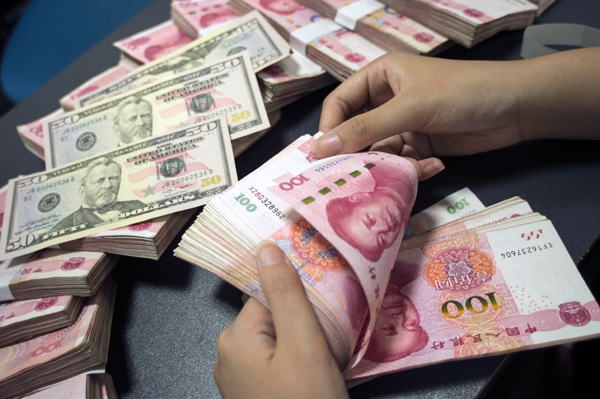Yuan not seen falling sharply
Updated: 2016-08-09 08:30
By JIANG XUEQING(China daily)
|
|||||||||
 |
|
A clerk counts yuan at a bank in Nantong, East China's Jiangsu province, July 28, 2016. [PHOTO PROVIDED TO CHINA DAILY] |
The Chinese currency will not depreciate sharply against the dollar by the end of this year, said Societe Generale SA, the French international banking group and financial services company.
He Xin, head of trading and managing director of Societe Generale China, said that he expected the yuan to fall slightly against the dollar to 6.8 at most in the next couple of months.
"The People's Bank of China, the central bank, has a strong ability and willingness to stabilize the exchange rates of the yuan," he said.
His forecast is based on the belief that the greenback will not get too strong, forecasting that the US Dollar Index may fluctuate between 92 and 97, rather than hitting 100.
Moreover, the US Federal Reserve is unlikely to raise interest rates until December or next year, due to significantly lower than expected second-quarter GDP numbers and the pressure to stabilize the stock market before the presidential election, he said.
Speaking of the possibility of an interest rates hike, Robert S. Kaplan, president and CEO of the Federal Reserve Bank of Dallas, said during a speech in Beijing on Tuesday: "Any removal of (monetary policy) accommodation in the US is got to be done gradually, patiently and cautiously, and subject to progress from upcoming data on reaching our dual mandated objectives."
As China has made a decision to allow the currency to float and also peg it against a basket of other currencies, he said, what comes with that is in light of the economic conditions here, China is going to have some currency volatility.
Based on his observation of the yuan exchange rates earlier this year, he said: "If you have a sudden and surprise adjustment in currencies, it can be jarring to China and then very quickly to the financial conditions around the world."
"It's going to take many years, maybe decades, for China to manage through overcapacity, high level of debt to GDP and industry transition. I think sudden jarring traumas would make that adjustment more challenging," he said.
Related Stories
China's forex reserves data may improve due to a stable yuan 2016-08-08 10:19
EU may lure UK's yuan business 2016-07-31 16:00
No disorderly yuan depreciation 2016-07-27 07:29
Economists predict yuan will experience further declines 2016-07-20 07:48
Central bank to keep appropriate liquidity, stable yuan 2016-07-05 10:01
Today's Top News
China consumer prices up 1.8% in July
Video introduces G20 city Hangzhou to Europe
Leaders of Iran, Azerbaijan seek to boost trade
Storm in Macedonia kills at least 17
Bank of England cuts rates to record low, restarts QE
Chinese tech to make Himalayan train possible
London unveils new anti-terror unit amid knife attack
Woman killed, five injured in London knife attack
Hot Topics
Lunar probe , China growth forecasts, Emission rules get tougher, China seen through 'colored lens', International board,
Editor's Picks

|

|

|

|

|

|







